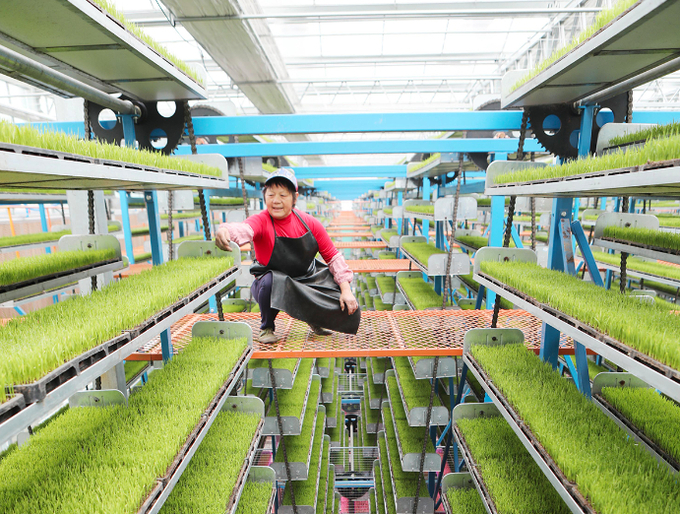November 27, 2025 | 02:18 GMT +7
November 27, 2025 | 02:18 GMT +7
Hotline: 0913.378.918
November 27, 2025 | 02:18 GMT +7
Hotline: 0913.378.918

A worker check the growth of seedlings at the intelligent seedling cultivation base in Shuangxing village, Xianlong town, Yongchuan district, Southwest China's Chongqing Municipality, on March 14, 2024. Photo: VCG.
The contribution rate of China's agricultural science and technology progress reached 63.2 percent in 2023, roughly 10 percentage points higher than that of 2012, amid efforts to enhance sci-tech self-reliance in the sector, an official with China's Ministry of Agriculture and Rural Affairs said.
The ratio was 62.4 percent in 2022.In the first half of this year, the ministry and 16 central government departments and agencies have identified a total of 401 tasks for scientific and technological breakthroughs and will publish the list soon, Zhang Xingwang, a vice minister of agriculture and rural affairs, said at a press conference in Beijing.
The list is aimed at better channeling scientific and research resources to sectors that are weak links and desperately need improvement, such as cultivating high-production, high-yield soybean breeds and development of smart and intelligent agricultural machineries, according to the official.
Aided by increased contributions from agricultural machinery and technology, China secured a total summer grain harvest of 149.78 million tons this year, up 2.5 percent or nearly 3.63 million tons year-on-year, the largest increase in nine years, according to the ministry.
Summer grain output per hectare continued to improve with efforts focused on improving corn, wheat and soybean yields.
The self-sufficiency rate for soybeans in China has increased by nearly 4 percentage points in the past several years, ministry officials said.
Experts said that the key to development of China's agricultural sector lies in harnessing the power of science and technology, given the country's large population and limited arable land.
The utilization of digital technologies, such as the use of drones and the Internet of Things tackles the lack of labor and pushes China's food security to a new height.
(Global Times)

(VAN) A new study reveals how the simultaneous effects of ocean acidification, salinity and loss of oxygen are making the world more fragile.

(VAN) Hopes are growing that the creation of the first 3D turkey gut model could be a turning point in the battle against the virulent blackhead disease.

(VAN) Tyson, America’s biggest meat supplier, plans to shutter one of its largest beef processing plants as the industry continues to struggle with low cattle supplies and political pressure from Washington.

(VAN) New FAO study shows how digital solutions are empowering farmers and fishers to prevent losses and build resilient agrifood systems.

(VAN) Brazil's COP30 presidency pushed through a compromise climate deal on Saturday that would boost finance for poor nations coping with global warming but that omitted any mention of the fossil fuels driving it.

(VAN) Poultry farmers in the UK have been warned that they could face one of the worst winters yet for bird flu.

(VAN) Prices of main-crop paddy have risen sharply, with jasmine rice hitting 16,100 baht per tonne — the highest level in years.